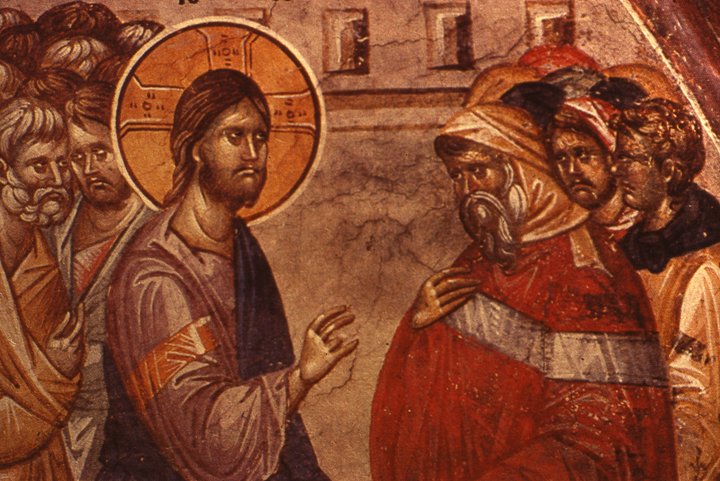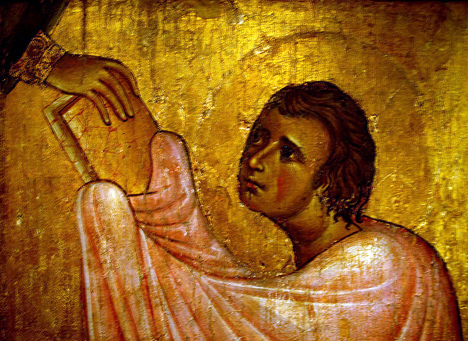
A doctor of the law disputing with Christ (provenance unknown).

A doctor of the law disputing with Christ (provenance unknown).
During the ministry of Jesus Christ on earth, the Holy Gospels quote Him making mention of the Commandments on several occasions, such as the following from St. Matthew:
… the Pharisees … were gathered together. And one of them, a doctor of the law, questioned Him, putting Him to the test, and saying, “Teacher, which is the great commandment in the law?” And Jesus said to him, “‘Thou shalt love the Lord thy God with all thy heart, and with all thy soul, and with all thy mind.’ “This is the first and great commandment. “And the second is like it, ‘Thou shalt love thy neighbor as thyself.’ “On these two commandments hang all the law and the prophets.” [Mt. 22:34-40 ONT]
or in the parallel account as recorded in St. Mark:
And one of the scribes approached and … questioned Him, “Which is the first commandment of all?” And Jesus answered him, “The first of all the commandments is: ‘Hear, O Israel, the Lord our God is one Lord; “‘and thou shalt love the Lord thy God with all thy heart, and with all thy soul, and with all thy mind, and with all thy strength.’ This is the first commandment. “And the second is like this: ‘Thou shalt love thy neighbor as thyself.’ There is no other commandment greater than these.” And the scribe said to Him, “Well, Teacher! In truth didst Thou say that God is one and there is not another besides Him; “and to love Him with all the heart, and with all the understanding, and with all the soul, and with all the strength, and to love one’s neighbor as oneself, is more than all the whole burnt offerings and sacrifices.” And after Jesus saw that he answered discreetly, He said to him, “Thou art not far from the kingdom of God.” [Mk. 12:28-34a ONT]
The reference that on "these two commandments hang all the law..." can be understood as making reference to the two stone tablets containing the Decalogue (Ten Commandments) that God had given Moses on Mount Sinai (e.g., Bishop Caesarius of Arles (+542) wrote "For the three [four] commandments which were written on the first tablet pertain to the love of God, while on the second tablet seven [six] commandments were inscribed, … Doubtless all of the latter are recognized as pertaining to love of neighbor." [ACCS OT Vol. III]). As recorded in the book of Exodus:
And the Lord said to Moses, Come up to me into the mountain, and be there; and I will give thee the tables of stone, the law and the commandments, which I have written to give them laws. … And he gave to Moses when he left off speaking to him in mount Sina the two tables of testimony, tables of stone written upon with the finger of God. [Ex. 24:12, 31:18 Brenton's LXX]

Moses receiving the Ten Commandments from God (provenance unknown).
It is important to understand that, for the True Christian, the Ten Commandments hold an important place in how to live a pious and moral life. As Jesus said:
“Do not begin to think that I came to abolish the law or the prophets; I came not to abolish, but to fulfill. For verily I say to you, until the heaven and the earth shall have passed away, one iota or one tittle in no wise shall pass away from the law, until all shall have taken place. [Mt. 5:17-18 ONT]
Thus, because of the importance of the Commandments to Orthodox Christians, it is useful not only to review them periodically, but to study them in detail—consulting the Church fathers—in order to insure they are operative in how we run our lives. Again as Jesus said:
“Whosoever then shall break one of the least of these commandments, and shall teach men so, he shall be called least in the kingdom of the heavens; but whosoever shall do and teach them, this one shall be called great in the kingdom of the heavens. “For I say to you, that unless your righteousness should exceed more than that of the scribes and Pharisees, in no wise shall ye enter into the kingdom of the heavens. [Mt. 5:19-20 ONT]
In this vein, a typical, abbreviated version of the Ten Commandments follows further below (cf. Exodus 20:1-17 and Deuteronomy 5:6-21), each with a link to commentary found in several Orthodox catechisms. The sources of the commentary are the English translations of three Orthodox catechisms attributed to: (1) His Eminence, Peter (Mogila), Metropolitan of Kiev, Halych and All-Rus' (+1646) [The Orthodox Confession of the Catholic and Apostolic Eastern-Church, London, 1762 (alternate translation here)]; (2) His Eminence, Feofan (Prokopovich), Archbishop of Novgorod (died 1736) [The Russian Catechism, Composed and Published by Order of the Czar, Philipps, trans., Westminster, 1723; note that, although this work is commonly attributed to Archbishop Feofan, it is attributed to an Archbishop Resenski in the translator's "advertisement"]; and (3), His Eminence, Philaret (Drozdov), Metropolitan of Moscow and Kolomna (+1867) [found in The Doctrine of the Russian Church, Blackmore, trans., Joseph Masters, London, 1845]. Metropolitan Peter is venerated as a saint in the Ukrainian Orthodox Church, the Russian Orthodox Church, the Romanian Orthodox Church, and the Polish Orthodox Church. Metropolitan Philaret is venerated as a saint in the Russian Orthodox Church. Archbishop Feofan should be read with caution as, for a time, he joined the Unia in order to receive an education in the West (and was a favorite of Tsar Peter the so-called "Great").
Introductory Material to the Decalogue Commentary
The First Tablet
First Commandment
Thou shalt have no other gods beside me. [Exod. 20:3 Brenton's LXX; cf. Deut. 5:7]
Second Commandment
Thou shalt not make to thyself an idol, nor likeness of anything, whatever things are in the heaven above, and whatever are in the earth beneath, and whatever are in the waters under the earth. Thou shalt not bow down to them, nor serve them; [Exod. 20:4-5 Brenton's LXX; cf. Deut. 5:8-9]
Third Commandment
Thou shalt not take the name of the Lord thy God in vain; [Exod. 20:7a Brenton's LXX; cf. Deut. 5:11a]
Fourth Commandment
Remember the sabbath day to keep it holy. Six days thou shalt labour, and shalt perform all thy work. But on the seventh day is the sabbath of the Lord thy God; [Exod. 20:8-10 Brenton's LXX; cf. Deut. 5:12a, 13-14]
The Second Tablet
Fifth Commandment
Honour thy father and thy mother, that thou mayest live long upon the land, [Deut. 5:16a,d Brenton's LXX; cf. Exod. 20:12a,c]
Sixth Commandment
Thou shalt not commit murder. [Deut. 5:17 Brenton's LXX; cf. Exod. 20:15]
Seventh Commandment
Thou shalt not commit adultery. [Exod. 20:13 Brenton's LXX; cf. Deut. 5:18]
Eighth Commandment
Thou shalt not steal. [Exod. 20:14 Brenton's LXX; cf. Deut. 5:19]
Ninth Commandment
Thou shalt not bear false witness against thy neighbor. [Exod. 20:16 Brenton's LXX; cf. Deut. 5:20]
Tenth Commandment
Thou shalt not covet thy neighbour's wife; thou shalt not covet thy neighbour's house, nor his field, nor his man-servant, nor his maid, nor his ox, nor his ass, nor any of beast of his, nor any thing that is thy neighbour's. [Deut. 5:21 Brenton's LXX; cf. Exod. 20:17]
Epilogue